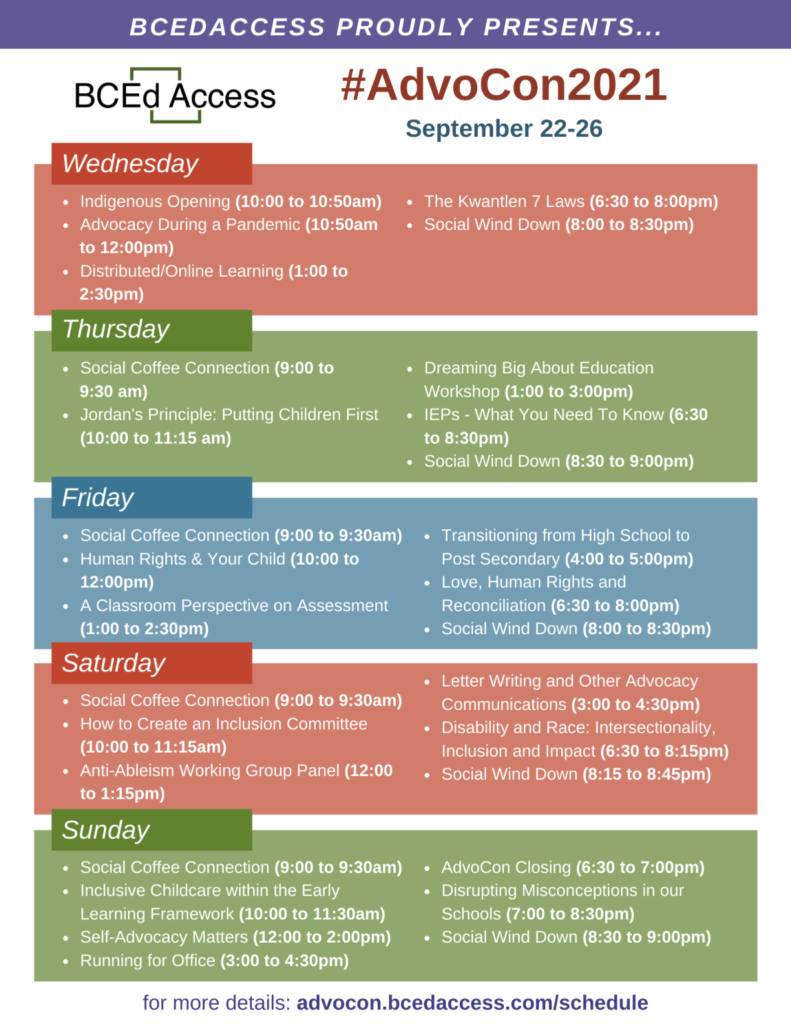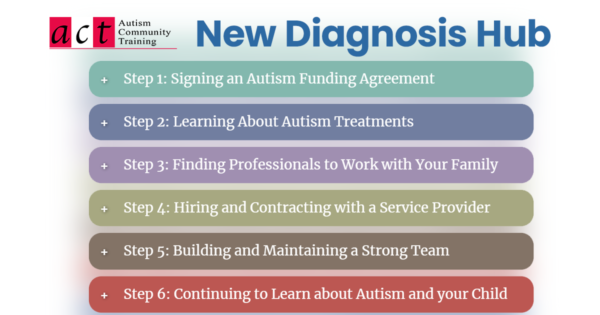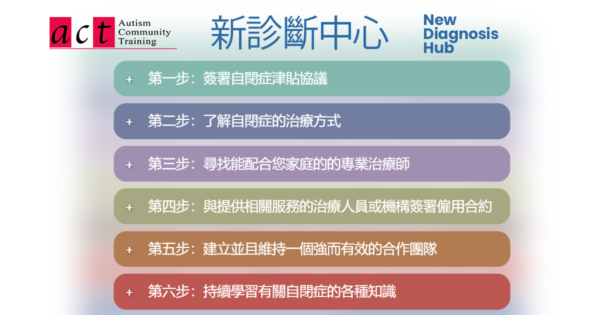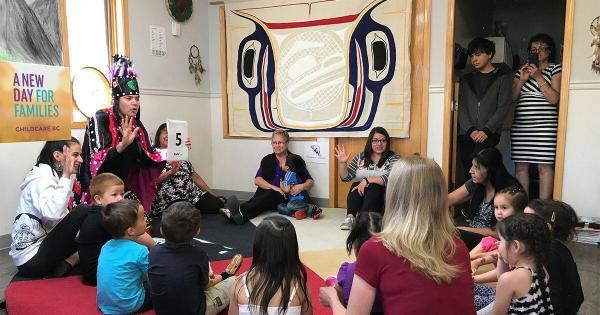What to do while waiting for your child’s assessment
 It is important that parents start the process as soon as concerns emerge as it can be as long as two years to wait for a publicly-funded assessment through the British Columbia Autism Assessment Network (BCAAN). If your child makes sudden developmental gains, which does happen, then you can cancel the appointment. Because of the long waiting lists, many parents decide to pay for a private diagnosis, but those waiting times are also long, from four to nine months.
It is important that parents start the process as soon as concerns emerge as it can be as long as two years to wait for a publicly-funded assessment through the British Columbia Autism Assessment Network (BCAAN). If your child makes sudden developmental gains, which does happen, then you can cancel the appointment. Because of the long waiting lists, many parents decide to pay for a private diagnosis, but those waiting times are also long, from four to nine months.
As of October 2021, funding for private assessment is available through Variety – the Children’s Charity for families with limited ability to afford the cost of private assessment. Their current processing time for grant application is about 8 to 10 weeks because of the volume of applications received. For information on Variety’s grant for private autism assessment, please see ACT’s Information Database. For Indigenous children live on reserve, there is also Jordan’s Principle providing funding for private assessment. For more information on Jordan’s Principle, please see ACT’s Information Database
Positive steps you can take while waiting
While an early diagnosis is important, there are many things that parents can do while they wait. This is especially true if they are struggling to understand their child’s challenging behaviors, which often stem from their communication delays. ACT has compiled information and resources on this page to help families navigate this stressful period with a focus on improving family functioning.
Unfortunately, many of the publicly funded services listed below also have waiting lists, so it is important to contact them as soon as possible. If you have concerns about your child’s development, remember that learning how to engage your child in developing their communication skills is important, regardless of their eventual diagnosis.
Ensure your referral has been received by BCAAN
It is a good idea to confirm with the Regional Coordinator for the BC Autism Assessment Network (BCAAN) to make sure that they have received a referral for your child – in case the doctor’s office has not sent it in. You can also find out about the latest wait time and if there is any additional information they need. This may not speed up the process, but will definitely avoid any unnecessary delay.
Get on the cancellation list if you are waiting for a private assessment
For a private assessment, ask if the clinic keeps a cancellation list which may allow an earlier appointment if you have flexibility.
Start a folder and keep a record
Organize and keep in a folder your child’s medical records and any previous developmental or behavioral evaluations. Electronically is preferable, as you can share them more easily. You can also keep your own notes and collect video clips observing your child’s behaviour in different places with different people. These will become very useful when the diagnostician requests specific information or when you need help answering the questionnaire.
Keep a record when you contact service providers – it can be confusing to deal with the many different organization/services listed below. It is helpful to take notes on which organizations you have contacted, including the name of the person you spoke with, the date, and what they said.
Access services and support within your community
Speech-Language Therapy services
Free speech-language therapy is available through local health units for children aged five and under who are language-delayed. You can ask your family doctor to make a referral or contact them directly. You may be put on a wait list and contacted when a Speech-Language Pathologist becomes available.
To find your local health authority, please see Regional Health Authorities

Infant Development Program and Aboriginal Infant Development Program
The Infant Development Program (IDP) is designed for children under age three who have either a developmental delay or disability, or are at risk of developing them. The Aboriginal Infant Development Program (AIDP) continues until age six and includes activities and materials that reflect local Indigenous cultures, customs, beliefs and values.
Both programs provide home-based prevention and early intervention services. Consultants assist families in acquiring the tools, skills and community connections needed to promote optimal child development and support developmental challenges.
Depending on the needs of your child, a consultant can link you to other services, including Supported Child Development, Aboriginal Supported Child Development, and Early Intervention Therapy. Referrals can come from either parents or professionals, such as public health nurses, doctors and others. As both programs are chronically under-funded, do not delay in seeking support as in many communities there are waiting lists.
To find your local Infant Development Program, you can search Healthlink BC Directory.
Supported Child Development Program and Aboriginal Supported Child Development
Supported Child Development (SCDP) and Aboriginal Supported Child Development (ASCD) are community-based programs intended to assist families of children who require extra support to attend their community childcare setting. SCDP provides support for childcare staff, families and their children, up to 12 years of age, in licensed daycare, preschool or out of school care programs. Services for youth 13–19 years are available in some communities. Self-referrals from parent and guardians or referrals from community and medical professionals are accepted. Both programs are chronically underfunded and waiting lists are long.
To find local Supported Child Development programs, see Healthlink BC Directory.
Early Intervention Therapy Program
Early Intervention Therapy Program (EIT) provides community-based occupational therapy, physical therapy, speech-language therapy and support services for eligible children and their families. These services support children from birth to school entry who have, or who are at risk of, developmental delay or disability. The EIT Program accepts referrals from families and professionals involved with the child and family. Often these services are provided through Child Development Centres but funded through the Ministry of Children and Family Development. Unfortunately, services are often limited by financial constraints and there are waiting lists.
To find the EIT program in your area, ask your public health nurse or physician, or contact your local Ministry of Children and Family Development office.
Waiting lists for EIT services often force families to hire therapists, privately, but many families cannot afford the fees involved. The Registry of Autism Service Providers (RASP) is a good source of therapists who can provide fee for service.
Child and Youth with Mental Health (CYMH) services
Children and youth can access free and voluntary community-based mental health supports and services from Child and Youth Mental Health (CYMH), provided through the Ministry of Children and Family Development. There are about 100 intake clinics in BC providing a range of mental health assessment and treatment options at no cost for children and youth and their families. The services usually include counselling, social work, parenting supports, and psychiatric services. However, families do experience significant waiting times unless their child is in crisis.
For more information on CYMH services in your area, please see Child & Youth Mental Health Intake Clinics
Learn more about autism and treatment options
Learning more about autism will help you develop questions to bring up during the assessment. It will also help you prepare to take action if your child is diagnosed with ASD as well as giving you practical strategies that can help you resolve challenges. Issues including toilet training and sleep affect many children with developmental delay. The resources below can help regardless of your child’s ultimate diagnosis.
A note of caution: it is important to make sure your information comes from credible sources provided by well-qualified researcher/clinicians. There are many promises of miracle treatments on the internet which can waste financial resources and vital time. ACT’s Autism Information Database (AID) has thousands of vetted resources on autism-related information. There are links to excellent international websites on a wide range of topics relevant to children, youths and adults with ASD and their families. While learning, it is helpful to:
- Know the signs of autism, and what is NOT autism. Your child is first and foremost a child, and some conditions (i.e. Gastro-intestinal struggles or severe behaviors) should be addressed regardless of your child’s diagnosis.
- Learn from your child. Every child is different, and every child with autism is different. Start keeping a journal of observations of your child. You can refer back to these to better understand your child’s progress and share them with teachers or therapists, whether your child receives a diagnosis or not.
- Begin researching intervention services. Whether your child gets diagnosed or not, the assessment may reveal a developmental delay or social communication challenge that could benefit from services such as behaviour intervention, speech therapy, or occupational therapy. The professionals conducting your child’s assessment can provide you with recommendations on intervention your child needs. For families who prefer to get the ball rolling on intervention service or those who want to know what to expect after the diagnosis, ACT’s New Diagnosis Hub provides practical and evidence-informed information to help families in BC put an intervention program in place for their child.
Ways of supporting your child at home
There are many ways that parents and the extended family can help a child with developmental delays in the home and community environment. Experts are very helpful to provide direction but your child is with you much more than with consultants or therapists. Below you will find a list of online resources, including ACT videos, that can give you new insights on how to help your child while waiting for your assessment.
Consult with community professionals (listed above) who are already working with your child, share your observations and concerns with them and ask for strategies you can implement at home to help your child.
Here are some free, practical and evidence-informed strategies from ACT’s Information Database and Autism Videos @ ACT including:
- Baby Navigator: online resources developed by First Word Project and Autism Navigator for families to support their baby’s early learning and nurture the development of language.
- Help is in Your Hands: online resource developed based on Early Start Denver Model (ESDM) practices to help parents add simple intervention practices to their everyday routines at home.
- What Can I Do with My Child All Day? Strategies for Supporting Young Children presented by Dr. Pat Mirenda and Dr. Paola Colozzo
- Parents are Teachers Too! Embedding Instruction into Daily Routines and Activities presented by Brenda Fossett, PhD, BCBA-D
- Make It Stop! Understanding and Preventing Problem Behaviors presented by Brenda Fossett, PhD, BCBA-D
- Helping Your Child with Autism Thrive in Sport and Recreation presented by Stephanie Jull, PhD
ACT’s staff can direct you to helpful information resources such as those listed above. We can also provide you resources on how to advocate for an end to waiting lists for children at risk of neuro-developmental conditions. Email [email protected] to start the conversation. ACT’s Facebook page also provides news updates of interest to parents.
Another source of individualized support and/or referral services, is the Ministry of Children and Family Development’s information service, which manages the Registry of Autism Service Providers (RASP) list:
Autism Information Services British Columbia (AIS BC)
3688 Cessna Drive, Richmond, British Columbia, V7B 1C7
Toll Free Line: 1-844-878-4700
Email – Info: [email protected]
Website: autisminfo.gov.bc.ca/
RASP List: autisminfo.gov.bc.ca/rasp/search
Visit ACT’s Registry of Autism Service Providers information page for more on the RASP.
AdvoCon 2021: BCEdAccess’ 7th Annual Education Advocacy Conference
ACT is a co-sponsor of AdvoCon 2021 in recognition of BCEdAccess’s outstanding advocacy.
Visit the AdvoCon 2021 website for details, full schedule, and tickets.
BCEdAccess is proud to present our 7th annual education advocacy conference! Join us online Wednesday, Sept. 22nd to Sunday, Sept. 26th for workshops, panels, and presentations for parents, guardians, educators, self-advocates, and supporters of students with disabilities and complex learners. ASL interpretation and CART captioning for all sessions.
Watch the conference live with chat and active listeners, or watch at your own pace. Hop onto Zoom for workshops and at the start and end of each day to get to know other attendees.

Registration now open for “Healthy Sleep” & “Improving Family Mealtimes” Workshops
Sleep and Neurodiversity:
Learn to Achieve Healthy Sleep
Friday, October 1, 2021
9:30 a.m.to 2:45 p.m. Pacific Time
Register by August 23rd to save $10

Presented by Hilary McClinton, M. Ed. &
Nicole Shallow, M. Ed., BCBA
This presentation focuses on sleep education, providing practical strategies to encourage healthy sleep.
This presentation will include:
- An introduction to the architecture of sleep and how it differs in the neurodiverse community.
- A review of basic sleep problems (e.g., early waking, insomnia) and how analyzing the child’s behavior can support families to achieve healthy sleep with a positive, pro-active approach.
- Through case studies, the process of assessment, plan development and support implementation will be described.
- A discussion of tangible takeaways to support healthy sleep for adults and children.
Registration closes Monday, September 27 at 4pm Pacific time.
Bursaries are available.
Improving Family Mealtimes, One Bite at A Time
Friday, November 26, 2021
9:30 a.m.to 2:45 p.m. Pacific Time
Register by September 27th to save $10

Presented by Lauren Binnendyk, PhD, BCBA-D &
Chantal Juilfs, M.Ed. BCBA
Many children and adolescents with autism and other neurodiverse conditions present significant concerns to carers who are trying to ensure proper levels of nutrition. The presentation will begin with a discussion of selective eating and the factors that can affect a child’s eating. Dr. Binnendyk will then discuss how food preferences develop and the importance of children tasting a wide range of foods.
Registration closes Monday, November 22 at 4pm Pacific time.
Bursaries are available.
ACT Acknowledges the Tragedy of Canada’s Residential Schools with Practical Support for Indigenous Communities
Canada Day 2021 is provoking mixed feelings among Canadians including shame that Canada has done so little to mitigate the horrific legacy of residential schools, despite calls to investigate the fate of Indigenous children who disappeared while in government care. Now we are confronted by evidence of hundreds of unmarked graves of Indigenous children. ACT believes that offering practical support is the most effective way to express ACT’s respect for Indigenous communities.
At our recent Annual General Meeting, ACT announced to our membership that we would provide free registration to our workshops and events for Indigenous organizations and families affected by autism and related conditions as a practical way of providing support to communities that continue to be severely marginalized.
All that is necessary is to submit a bursary application – apply for Executive Functions Skills with Sarah Ward directly here. We would also like to offer the support of our staff for Indigenous families who wish to better understand the Autism Funding Program but do not want to contact offices of the Ministry of Children and Family Development. We can be contacted at [email protected] or toll-free at 1-866-939-5188.
ACT’s Updated ‘New Diagnosis Hub’ – Now also in Chinese!
 ACT’s ‘New Diagnosis Hub‘ has been updated in English to help families receiving a new diagnosis of autism for their child. It provides clear information on how to access government-funded services in British Columbia and how to spend the funds wisely. It is also helpful to families who may have received a diagnosis some time ago but are wanting to rethink their child’s program.
ACT’s ‘New Diagnosis Hub‘ has been updated in English to help families receiving a new diagnosis of autism for their child. It provides clear information on how to access government-funded services in British Columbia and how to spend the funds wisely. It is also helpful to families who may have received a diagnosis some time ago but are wanting to rethink their child’s program.
ACT has also translated the New Diagnosis Hub in Chinese, as part of ACT in Chinese, to meet the needs of many families across BC. There are several other large immigrant communities, as well as deaf and hard-of-hearing individuals, we would like to better serve by providing captioning and translation. It is very difficult to understand autism and services if you don’t have a strong command of English. Indeed it is very challenging even if you do. Please support ACT’s ability to caption and translate resources in additional languages by donating to our special translation fund.
 新手家長的下一步
新手家長的下一步
ACT 的這個新診斷中心,是要幫助卑詩省新確診為自閉症譜系障礙(通稱自閉症)兒童的家長們建立一個有效的治療計劃。中心內的資訊同時也適用於一些孩子已經得到診斷有些時日,但正在重新考慮孩子治療計畫的家庭。

